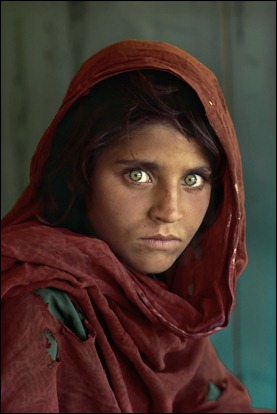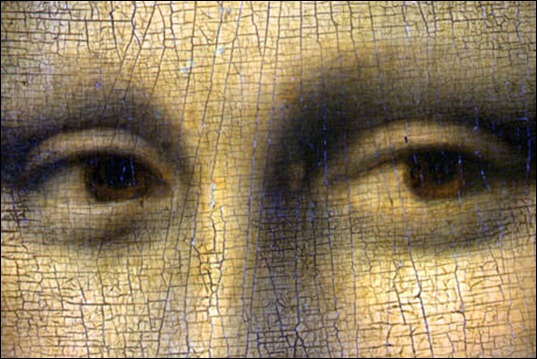 |
The Roman philosopher Cicerone (Cicero) once said:
"Ut imago est animi voltus sic indices oculi"
("As the face is the image of soul so the eyes are its mirror").
|
| Above: Sharbat Gula by Steve McCurry |
|
We have many interesting expressions in Italian that derive from the word occhio (eye), but let’s begin with the more literal vocabulary which we use to describe the eye itself and its related vocabulary, translated from English to Italian for easy reference:
the eye = l’occhio, plural gli occhi
the eyebrow = il sopracciglio, plural le sopracciglia (changes from masc. to fem. in plural)
the eyelash = il ciglio, plural le ciglia (see above)
the eyelid = la palpebra, plural le palpebre
the white of the eye = il bianco dell’occhio
the iris = l’iride
the pupil = la pupilla
the glasses = gli occhiali
the sun glasses = gli occhiali da sole
the reading glasses = gli occhiali da vicino or gli occhiali per leggere
the eye specialist = l’oculista
the optician = l’ottico (note the Latin root of the word optician)
the contact lenses = le lenti a contatto
 |
| The worlds most famous eyes? La Gioconda by Leonardo Da Vinci |
Now let’s look at some expressions using the word occhio:
The first of these is simply occhio! which means ‘look out!’ or ‘be careful’. We can extend this by naming that object to ‘be careful’ of, e.g.: occhio alla macchina! (look out for the car!), or occhio alle dita! (mind your fingers!), and so on.
dare un’occhiata means to have a look at something or to glance at something, e.g.: ci do un’occhiata sto pomeriggio (I’ll have a look at it this afternoon), or ci ho già dato un’occhiata (I’ve already looked at/had a glance at it).
tenere d’occhio means to keep an eye on, e.g. ci potresti tenere d’occhio i gatti mentre siamo via? (could you keep an eye on the cats while we are away, please?)
vedere con la coda dell’occhio means to see from the corner of one’s eye, e.g. mentre ero giù al fiume con la coda dell’occhio ho visto un martin pescatore (while I was down at the river I saw a kingfisher from the corner of my eye)
strizzare gli occhi means to squint, e.g. senza gli occhiali da vicino devo strizzare gli occhi per leggere (without my reading glasses I have to squint to read)
fare l’occhiolino means to wink, e.g. hai visto? quella bella ragazza mi ha fatto l’occhiolino (did you see? that beautiful girl winked at me)
a quattr’occhi means in private, e.g. devo parlarti a quattr’occhi (I need to talk to you in private)
dare nell’occhio means to attract attention or to stand out, e.g. vestita così dai troppo nell’occhio (you stand out too much dressed like that)
We also have the interesting expression ad occhio e croce meaning roughly, e.g. ad occhio e croce direi che è lungo due metri (I would say it’s roughly two meters long)
A presto, Geoff


Comments:
June:
Geoff: Io ho un paio d’ occhiali da vista. Vabbene o no? JS
Geoff:
@June Salve June, è meglio usare ‘ho un paio di occhiali’.
P.S. It’s not necessary to use ‘io’ because ‘ho’ already means ‘I have’, e.g. ‘hai un paio di occhiali da sole?’ = ‘have (you) got a pair of sunglasses?’ (rather than ‘tu hai un paio ecc’)
saluti da Geoff
Mark Arrington:
What about the expression “occhi bianche nere”? It’s in the song “La Mama di Rosina”.
Geoff:
@Mark Arrington Innanzitutto, dovrebbe essere ‘occhi bianchi e neri’ (masc.), comunque, al di fuori della canzone questa espressione non esiste. Mi sa che è stata inventata proprio per la canzone.
Saluti da Geoff